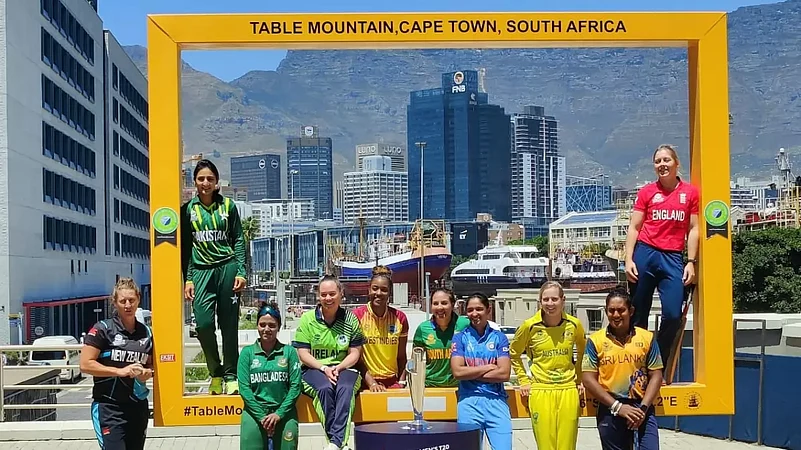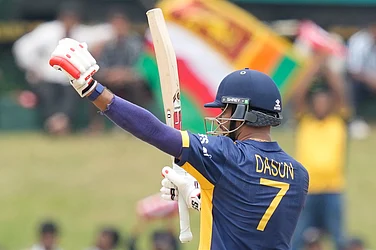Table Mountain in Cape Town formed the apt background for India’s Harmanpreet Kaur, along with other captains at the ICC Women’s T20 World Cup, to pose for a picture on tournament eve. Women players across the world have climbed many mountains, metaphorically speaking, to get where they are today.
Kaur, from the drug-ridden Moga district in Punjab, was lucky enough to be born in a progressive, sports-loving home. But she would be told by her father Harmandar’s friends to take singles and not attempt big hits. As a girl she wouldn’t be able to hit that far, they believed.
How wrong they were. Perceptions changed soon as Kaur grew into a sixer beast, and after she scored an epic 171 not out in the 2017 World Cup (50 overs) semifinal against Australia.
"I used to keep quiet [when her father’s friends coached her]. After watching last year's [2017] World Cup, they started believing maybe my teammates and I can clear the rope," Kaur said in an interview in 2018.
In the delightful film ‘Bend it Like Beckham’, the protagonist, a football and David Beckham-obsessed Punjabi girl in England, puts up posters of her hero on the wall. Kaur once revealed that walls in Punjabi homes are for tributes to the higher power only. But she, too, couldn’t stop herself from pasting a poster of
Virender Sehwag at her home. She was prepared to be reprimanded by her father. But the sports fan dad, who always encouraged his girl, simply laughed.
Things were tougher for women cricketers in Pakistan. And the nation still hasn’t grown in women’s cricket as much as India. But at least they have a team on the circuit. And it was two feisty sisters – Shaiza and the late Sharmeen Khan – who made it possible.
The sisters grew up on 80s Pakistan cricket – the era of Imran Khan and Javed Miandad – and wanted women in the country to play too. But they faced resistance, including death threats, from religious fanatics. Shaiza and Sharmeen, however, were born in privilege. They were England-educated daughters of a wealthy carpet businessman. So when help or encouragement wasn’t forthcoming, they built their own infrastructure for an entire team to train. They also used their influence and determination to set up a parallel women’s cricket body, and established the sport in Pakistan. Benazir Bhutto becoming Prime Minister in 1988 also brought about a greater, if grudging, respect for female ambitions in the country. Shaiza and Sharmeen were in the team that travelled to India for the 1997 Women’s World Cup, Pakistan’s first.
Today, it is almost a problem of plenty for women’s cricket, at least in some countries. The cash-rich WPL is a big reason for that. In fact, one of the challenges teams will face at the T20 World Cup is to not get distracted by the WPL auction, to be held in Mumbai on February 13. A day prior, India will open their World Cup campaign against Pakistan.
As world no. 4 India attempt to win their first World Cup at the senior level, Kaur assured doubters their eyes would be on the task at hand.
“The World Cup is more important than anything else,” she said. “Our focus is on the ICC trophy. These things [like the auction] will keep coming, and as a player, you know what’s important for you and how you need to keep your focus. We are all mature enough and know what is important for us.”
New Zealand captain Sophie Devine hit the nail on the head, saying, "It's [the auction] the elephant in the room. You talk about glass ceilings and I think the WPL is going to be the next stage. I am really excited about it. Some people are going to get picked up; some people won't. And you are going to get a value attached to what you are worth, which, as human beings, is not the nicest [thing]. But it's also a job and it's what we've put our names in for."
Coinciding with the World Cup is a fresh report by the FICA (Federation of International Cricketers’ Associations) that throws up insights on the women’s game. According to the study, 207 central contracts have been awarded among 11 national teams. As a result, the scope to earn a livelihood from cricket for a woman has gone up by 75 per cent.
On the minus side, the WPL will inevitably divide players’ loyalties between country and franchise. FICA surveyed more than 150 women players, of which 48 per cent said they would choose a lucrative league contract over a national one. A majority of the respondents also felt there was gender discrimination in the sport.
But for now, it’s time for the T20 World Cup, the eighth of its kind, representing one more step forward for the ladies.


























